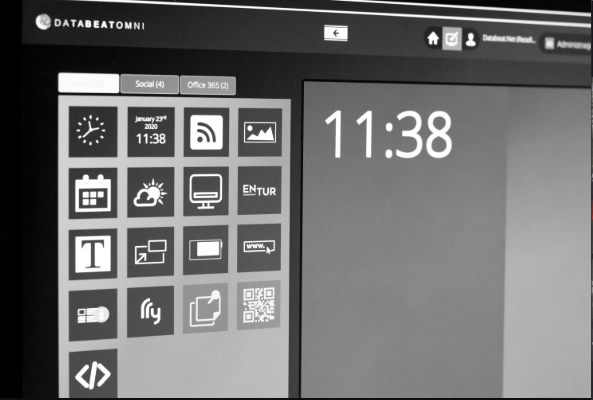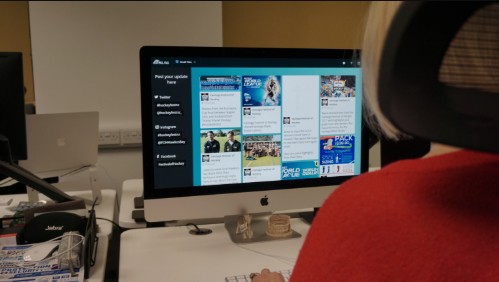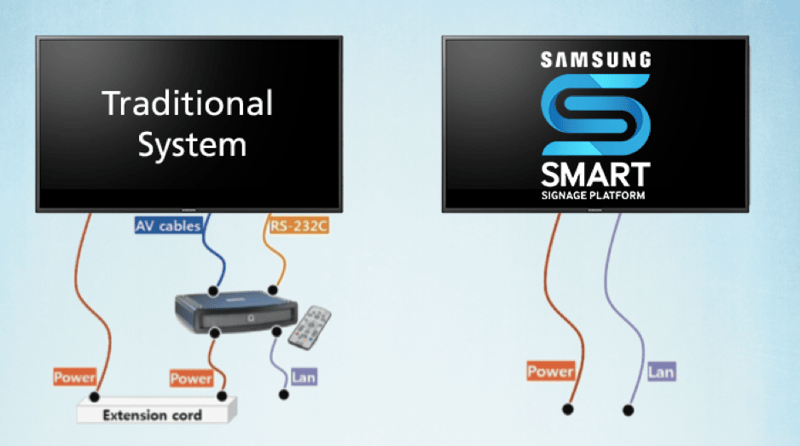2020 was an excellent year for the digital signage industry as well as for Databeat. Our vision is setting roots with our ever-growing customer base. Companies and teams want to have more control over their digital signage solution. They want to publish and manage their content themselves, again taking the lead for creating a better experience for their customers and audience.
The focus on operations and cost-management is becoming ever more evident, customers want to have a solution that works, minimal downtime, and a bill which they are happy to pay because of the return on investment they get!
Moving briefly back to the customer experience - the focus on creating a better experience for your customers is vital for all businesses, a recent study from PWC shows that companies that at core focus on always improving customer experience, will see direct and positive results on their bottom-line.
Digital signage companies are now more focused on streamlining their solutions towards the cloud, giving the user the flexibility to access the software at any moment to make changes to their content schedule, delivery, and content. To mention that, this is not something new for 2021, but this is now the standard that every company requires from its digital signage provider.
1. Integrations: opening up for collaboration
The industry of apps and software has been booming for the past three years. Companies are using many more solutions, and many of them are facing the issue of relating to many different systems, which causes the corporate syndrome of ineffectiveness and unproductive teams.
Making solutions working better together with leveraging API is an essential factor for many businesses. The digital signage industry has been slow to act, but now is slowly but surely being implemented and prioritized.
We, at Databeat, have, in the past year, been extremely focused on integrations. We are integrating DatabeatOMNI with apps such as Power BI and Sway, to mention a few. Our job is to make sure that you can share and publish content that you already have, in a fast and straightforward way.

So a key trend for the digital signage industry for 2021 will be making it available for sharing more information across platforms and optimally making solutions collaborate better.
Related Read: Ask Databeat: Digital Signage Integrations You Need to Know
2. More focus on security
Security for a long time has not had the attention that it deserves. Digital signage software companies have not had this task high up on the agenda. This is resulting in many embarrassing moments for many companies that are utilizing digital signage. From hackers getting into the system and publishing unwanted content to employees dropping personal images to the company's media plan, this isn't very good for the brand and social responsibility.

Since digital signage software providers are moving towards the cloud, keeping customer information secure is of the highest importance. In light of GDPR, there are even more strict rules and regulations on how companies manage personal data.
Signing in via third-party apps such as Google or Microsoft ensures that the user chooses to share what type of information they want. Multi-factor authentication and 2 step verification is now uttermost importance. Specific user-roles is also a must-have criterion for business choosing digital signage software. This will ensure that every user has the right role type and closes the gap for human error.
Concerning security, I wanted to point out that the network is also a vital element. I could write a whole another just on this topic, but I will mention a few key points. Having a dedicated network for your digital signage is essential, even for small businesses. For wireless or wired, it's necessary to set specific rules to make sure that everything is running smoothly. We always recommend using a wired network because it's much more stable than wireless.
3. Digital signage is becoming the new HR manager
Keeping teams and employees informed with the latest news within the company, numbers and KPI's is and will always be hard. Companies have been investing in intranets, systems, and apps to keep the troops informed with the latest happenings. Still, with the latest reports showing that it has just become another tool to use, people only loose interest and forget to check it frequently unless if it's an essential thing. The countless emails and notifications sent by the HR manager to the employees and teams are being ignored, there must be a better way to communicate information within the company; well, there is.
Here at Databeat, the trend that we see-companies are starting to use digital signage internally to keep their employees informed with news and overall performance of the company. Instead of sending a ton of emails for minor updates within the company, share it on a screen in the area which is frequented by employees, next to a vending or coffee machine. By using short and crafty messages, you will ensure an almost 80% hit rate with your digital signage poster.

Keep your people motivated and encourage for self-development
We know that one of the main drivers for a companies success is the employees. Keeping them motivated is critical; materials bonuses are great but have a very short-term effect. Sharing information about the company's growth, successful and unsuccessful marketing campaigns, actually showing the employees what they are apart of, this also creates a sense of pride and enhanced focus.
Related reading: Check out how Schneider Electric keeps its employees informed
4. Better and improved hardware
In the last three years, digital signage hardware has greatly improved and become cost-effective. Suppliers such as Samsung, LG, and Sharp have and will invest more in these divisions to supply the rise of the demand. The impact of an improved supply-chain will reduce the price on more standard and generic models, and this is quite positive for small businesses to make use of digital signage in a smaller scale.
Samsung's latest award-winning public display product called the "The Wall," which is a modular microLED display delivering a revolutionary viewing experience with pure black, exact color, and Samsung's AI picture enhancement. Check out this video to see it in action.
One of the latest offerings from LG is the flexible OLED public display screens, which allows you to shape your digital signage towards the interior of the location or space. With these public display screens, LG has taken it to another level. Check out this video, where they go over the features of the flexible screens.
Interested in learning more about digital signage hardware, check out the magazine Digital Signage Today.
Ditch the black box
The trend we see in the hardware segment is that businesses are ditching the black boxes for public displays with System on Chip solution. This will provide a much smoother operation, which means that it will be easier to manage and less lose parts. This also means there is more focus on the software end, optimizing, and making both hardware and software working better together.

5. AI and the future
Much can be said about the future of digital signage. In 2020 there has been a lot of hype around digital signage and AI, but what does it mean? Can digital signage take on a role to personalize messages or respond to a situation in real-time? The answer to this is: Yes, and here is what we know so far:

Personalization:
Every customer wants to feel important and have a personalized experience. AI and deep learning are the tools to make it happen. Soon, digital signage platforms, powered by AI and deep learning, could recognize customers.
Relevant content
In-store shopping continues to decline in favor of online shopping. That means retailers need to create experiences for shoppers who visit their brick-and-mortar stores. Many have already been using digital signage to promote sales or offer customers an in-depth look at products.
AI can take it to the next level with personalization. The business already has historical data on its customers and their behaviors. Specific content is already created that plays at certain times or days. That's the baseline that informs what content these consumers would most want to see.
There are many advances in AI on the software end, but not much has been done within the digital signage industry, there are beta versions here and there but nothing that has set the standard or benchmark in the market.
And in conclusion..
There has never been as much innovation within the digital signage industry as in the past two years. We see that cloud-based solutions are leading way. With more focus on customer experience, integrations and security digital signage companies are growing at a rapid pace. Businesses have understood that digital signage is just not an advertising tool but is an essential part of the marketing mix and has a role to play for their business operations.
Did you know that digital signage is a powerful tool to improve ROI? To find out more, click the button below to download our free guide,‘The Definitive Guide to Digital Signage ROI'.







.png)